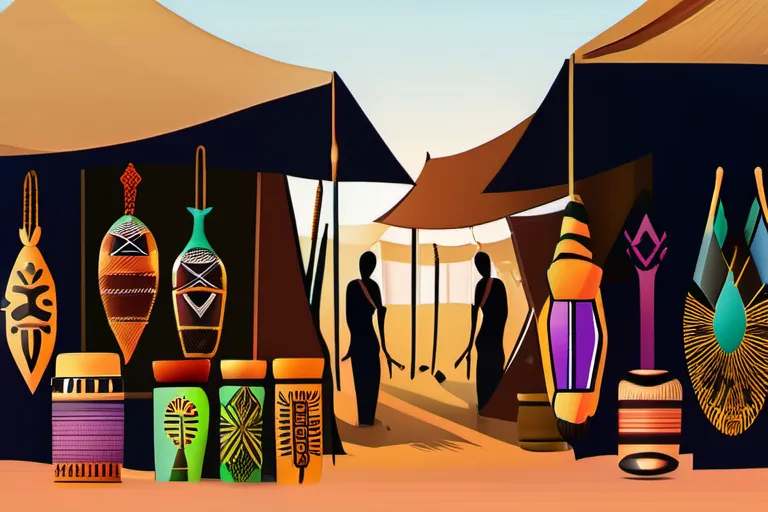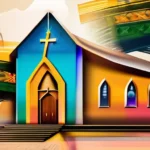Explore the origins, beliefs, practices, and significance of African Voodoo in this detailed article.
African Voodoo, also known as Vodun or Voudou, is a complex religious system deeply rooted in West African cultures. This guide will delve into its history, beliefs, rituals, and the role it plays in contemporary societies.
The Origins of African Voodoo
The origins of African Voodoo trace back to the ancient cultures of West Africa, a vast region that includes countries like Nigeria, Benin, Togo, and Ghana. Imagine a timeline stretching back thousands of years, where different tribes and communities shared common beliefs but expressed them in unique ways. How did these diverse groups come together to form such a rich and complex spiritual tradition?
African Voodoo is deeply rooted in the cosmology of its people—viewing the world as interconnected through spirits, ancestors, and deities. The Fon people of Benin, for instance, believe that their gods (orixas) govern natural phenomena, while the Yoruba of Nigeria have a pantheon led by deities like Ogun, the god of iron and war. But how did these beliefs evolve over time?
The transatlantic slave trade dramatically impacted African Voodoo’s development. Enslaved Africans were forcibly taken from their homes to plantations in the Americas, bringing with them their spiritual practices. In this new environment, the syncretism of African and European beliefs emerged. For example, in Haiti, Voodoo merged with Catholic saints, creating a unique form that still thrives today. How did these enslaved Africans adapt their beliefs to fit into the new world they found themselves in?
The blending of traditions is also evident in the practices associated with Voodoo. In some communities, rituals involving ifà, a complex divination system, are used to seek guidance from deities and ancestors. Offerings like food, drinks, and sometimes even small animals are presented as gifts to appease these spirits. But why is it that these offerings play such an important role in Voodoo practices?
Through this process of adaptation and integration, African Voodoo has become a testament to the resilience and creativity of its people. It stands not only as a spiritual practice but also as a cultural identity, connecting individuals to their past while providing a framework for understanding the present.
Beliefs and Practices of African Voodoo
African Voodoo, often seen as a mysterious and intricate web of beliefs, invites us to delve into its heart and explore its core practices. But before we embark on this journey, let’s ask ourselves: What exactly do these spirits mean in the context of Voodoo?
In African Voodoo, spirits are not just entities but vibrant forces that weave through daily life, influencing everything from personal fortunes to community well-being. They are akin to guardians, each with their own unique character and purpose, much like how different family members bring distinct qualities to a household.
- Communion with Spirits: Rituals in Voodoo serve as gateways for believers to communicate directly with these spirits. These rituals often involve offerings of food, drinks, and sometimes even small animals, reflecting the idea that these spirits require sustenance just like humans do.
- Rituals can be seen as a form of dialogue, where the community speaks to the spirits through songs, dances, and prayers, seeking guidance or expressing gratitude for blessings received.
- Healing Practices: Another crucial aspect of Voodoo practices is healing. The belief that illnesses can be caused by spiritual imbalances leads to the use of herbs, charms, and rituals aimed at restoring balance and health. It’s a holistic approach where both physical and spiritual well-being are considered interconnected.
One cannot overlook the power of offerings in Voodoo practices. These offerings aren’t just symbolic gestures but active invitations to engage with the spirits, fostering a sense of community and shared purpose. Think of them as keys that unlock doors to deeper connections and understanding.
Through these rituals and offerings, African Voodoo not only addresses spiritual needs but also strengthens communal bonds. It’s a tapestry where each thread—be it a prayer, dance step, or ritual offering—is crucial in maintaining the vibrant life of this ancient tradition.
The Significance of African Voodoo in Contemporary Societies
The significance of African Voodoo extends far beyond its historical roots, permeating contemporary societies on both sides of the Atlantic. How does it continue to shape cultural identities and social structures in modern times? Imagine a vibrant marketplace where vendors sell not only goods but also amulets and charms believed to bring good fortune; these are often products of voodoo practices that have taken root across generations. These small, seemingly innocuous trinkets hold profound meanings, acting as tangible links to ancestral spirits and protective forces in everyday life.
African Voodoo plays a crucial role in addressing the psychological and emotional needs of its followers. In many communities, it serves as a source of comfort during times of hardship or uncertainty. Consider the metaphor of a stormy sea; just as sailors might seek guidance from their deities to navigate treacherous waters, individuals turn to voodoo practices for solace and direction in turbulent personal lives. This spiritual support network fosters a sense of community and shared experience that transcends geographical boundaries.
In the diaspora, African Voodoo has adapted yet retained its core essence. From Haiti to Brazil, these practices have evolved into syncretic forms blending local traditions with their African origins. The significance here lies not just in preserving cultural heritage but also in creating new identities that honor both past and present. How does this adaptation reflect the resilience of African diasporic communities? It speaks volumes about the enduring power of spiritual bonds that connect people across oceans and centuries.
The influence of Voodoo can be seen in various facets of society, from politics to entertainment. Politicians may invoke voodoo symbols for their campaigns, tapping into a deep-seated cultural reverence; meanwhile, film and literature often draw on voodoo themes to explore complex human emotions and behaviors. These portrayals not only entertain but also educate the public about the richness and complexity of African spiritual practices.
In essence, African Voodoo continues to be a vital force in contemporary societies, offering insights into the human quest for meaning, connection, and protection. Its enduring presence challenges us to reconsider our perceptions of spirituality and its role in shaping our identities and communities.
The Role of Shamans in African Voodoo
Imagine stepping into the heart of an ancient ceremony, where the air is thick with the scent of incense and the flickering light of candles casts long shadows across the room. This is where the role of shamans in African Voodoo becomes vividly clear—like guardians of a sacred tradition, they guide their communities through both the visible and invisible worlds.
Shamans are not just healers or spiritual leaders; they embody a bridge between the earthly realm and the divine. Their journey to this position is often as mysterious and intricate as a winding path through dense forests. These individuals undergo rigorous training, which can take years, during which they learn to communicate with spirits and ancestors, a task that requires not only knowledge but also a deep personal transformation.
So, how do shamans shape the community’s beliefs? Through their profound connection to the spiritual world, shamans offer guidance on matters ranging from health to prosperity. They act as intermediaries, interpreting signs and offering solutions when faced with challenges. Their role is pivotal in maintaining balance and harmony within the community, much like a skilled gardener who tends to each plant with care.
When we consider the importance of shamans in Voodoo, it’s akin to recognizing the heart of a tree—without it, the entire structure crumbles. These individuals are not just practitioners; they are custodians of cultural heritage and keepers of knowledge that spans generations. Their wisdom is invaluable, yet often misunderstood or misrepresented by those who fail to grasp its true significance.
Criticisms and Misconceptions of African Voodoo
Have you ever wondered why African Voodoo is often misunderstood? It’s as if this ancient practice, rich with history and cultural significance, is trapped in a web of misconceptions. Is it really just about curses and black magic? Let’s peel back the layers and explore some common criticisms and misconceptions surrounding African Voodoo.
One of the most persistent myths is that Voodoo is nothing more than a practice centered around cursing or causing harm to others. However, this couldn’t be further from the truth. In reality, Voodoo is deeply rooted in community support, healing, and spiritual guidance. Is it really about just inflicting pain?
Voodoo practitioners, known as houngan (male) or manbo (female), often play crucial roles in their communities. They are healers, advisors, and mediators between the physical world and the spiritual realm. Their practices are about invoking positive forces to bring good fortune, protect, and guide individuals and communities. The idea that it’s all about dark magic is a superficial oversimplification of a complex belief system.
Misunderstandings also arise from the portrayal of Voodoo in popular media. Movies and TV shows often depict it as a terrifying force with no redeeming qualities. Is this really how you want to represent an ancient culture? These depictions fail to capture the true essence of Voodoo, which is more about connection and harmony with nature and spirits.
African Voodoo is also frequently criticized for being backward or primitive, ignoring its sophisticated religious practices and rituals. It’s important to recognize that it has evolved over centuries, integrating elements from various cultural influences while maintaining core traditions. Its complexity and depth make it a fascinating area of study and understanding. Can we really dismiss an entire religion based on stereotypes?
Dispelling these myths involves educating ourselves about the true nature of Voodoo. By engaging with authentic sources, listening to practitioners themselves, and seeing beyond surface-level representations, we can gain a more accurate and respectful understanding. The future of African Voodoo lies in this education and appreciation, ensuring it continues to thrive as an integral part of many cultures.
The Future of African Voodoo
As we delve into the future of African Voodoo, it’s like peering into a canvas that is constantly being painted with new strokes. The question arises: How will this ancient practice adapt and evolve in our rapidly changing world? Will its essence remain intact, or will modernity alter its core beliefs and practices?
African Voodoo has always been resilient, much like a tree that stands tall through storms. In the face of globalization, it faces challenges but also opportunities for growth. One challenge is the preservation of traditional knowledge. With younger generations often moving away from rural areas to urban centers, there’s a risk that valuable cultural heritage could be lost. How can Voodoo communities ensure their traditions are passed down effectively in today’s interconnected world?
Another challenge lies in reconciling Voodoo with modern secular society. Some may view Voodoo as outdated or incompatible with contemporary life. However, the practice thrives on its ability to offer solace and meaning in a complex world. Voodoo provides a framework for understanding one’s place within the community and nature, making it more relevant than ever.
The future also holds immense opportunities for Voodoo to contribute positively to society. Its emphasis on communal support and spiritual healing can be integrated into modern healthcare practices. By acknowledging its benefits, communities might find ways to incorporate Voodoo rituals in therapeutic settings, offering a holistic approach to well-being.
Moreover, as global awareness of cultural diversity grows, there’s a chance for Voodoo to gain recognition and respect on the international stage. Through educational programs and cultural exchanges, people can learn about its rich history and philosophy, fostering understanding and appreciation.
In conclusion, while the future of African Voodoo is uncertain, it holds immense potential to evolve in ways that honor its roots yet embrace modernity. As we continue to explore this complex religion, let’s remain open to its lessons and possibilities for a more connected and spiritual world.
Conclusion
 By understanding the rich tapestry of African Voodoo, we gain insights into the diversity and resilience of African cultures. This knowledge fosters respect and appreciation for traditions that have endured for centuries.
By understanding the rich tapestry of African Voodoo, we gain insights into the diversity and resilience of African cultures. This knowledge fosters respect and appreciation for traditions that have endured for centuries.











